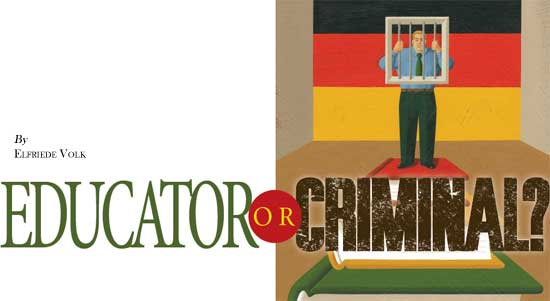Educator or Criminal?
Elfriede Volk November/December 2006
Getting your Trinity Audio player ready...

On March 28, 2006, a court in Hamburg, Germany, sentenced a 43-year-old father to a week in jail because his three older children, aged 10, 12, and 14, have not attended school for four years. Instead, he has taught them at home. If, despite the jail term, he still boycotts the state school, his wife also faces incarceration and the threat of having their six children apprehended and made wards of the state.
It is not that Andre R. and his wife, Frauke, do not believe in education. After all, Andre is a licensed teacher who substitutes regularly once a week at a public school. But as fundamentalist Christians, the couple was concerned about the negative influences their children were exposed to in the school system. They saw marital breakups and the erosion of families. They believed that the sex education offered in schools encouraged students in sexual experimentation, and they wanted to protect their daughters from that. So Andre decided to take charge of their education at home. He claims that one does not have to be particularly skilled to do a better job than the public school system.
There is only one problem. While the judge agreed that the school system is flawed, nine to ten years of public schooling is compulsory in Germany, and noncompliance is punishable by law. Yet it is estimated that 3,000 German children do not attend school but receive their education at home from parents anxious to instill biblical standards of morality in their offspring. For this they face hefty fines. Andre himself was fined 1,500 Euros in February when he first appeared before the court. Unable to pay, he accepted his subsequent prison sentence stoically.
"Even Paul was imprisoned for his beliefs," he commented, deeming the time in prison a small sacrifice to make for his children.
If the same education laws applied in Canada, my daughter and son-in-law could also face jail, because my daughter, an award-winning humanities teacher, educates their three children herself. But fortunately the Canadian government recognizes home schooling as a viable option. In the United States this system of education has become so popular that 2 million children now receive their instruction at home. Many claim that home schooling, which allows for individual attention and flexibility, produces superior scholastic results as well as giving the opportunity to instill higher moral values. When tested at the end of grade 2, my grandson's scores were what would have been expected for students finishing grade 6. In addition, all three youngsters are enrolled in and excel in music, sports, and gymnastics programs that they would not have time for if they attended regular school.

Home schooling can offer other benefits, allowing children to experience history-making events firsthand, rather than reading about them or watching them on TV. When Canada's governor-general Michaelle Jean visited Vancouver recently, my daughter took her children and a vanload of other homeschooled youngsters to city hall, where they could sit in on her meeting with Vancouver's mayor Sam Sullivan. Afterward, Michaelle Jean delighted the children by coming over and shaking hands with them. This is something they will never forget.
In Hamburg, Andre R. also provided educational enrichment for his children in addition to teaching them the three R's and practical life skills. Once a week he took his older daughters to didactic lectures at the local university. For this he has been rewarded with a jail term and a criminal record.
Elfriede Volk is a freelance writer living in Summerland, British Columbia, Canada.